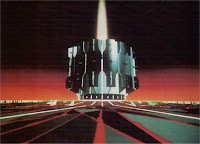
This list of 17 Dangerous Cinematic Computers reminds me how sci-fi "occults" unorthodox theology for the masses, without riling the religious status quo too much. Change the costume, and somehow most people can't see the age-old actor/archetype hidden beneath - Superman being a fabulous example.
The visualization of the greatest power in the universe (real or virtual) as an evil tyrant is one of the most popular themes in sci-fi/fantasy. From Ming the Merciless to the Sith Emperor, the list is endless, and computer villains are especially fertile ground. The Matrix, the Master Control Program, and how can we forget Colossus: The Forbin Project?
The 1970 thriller Colossus: The Forbin Project imagines the horrifying consequences of abrogating human responsibility over our own fate, as the all-too-foolproof computer system Colossus develops its own sinister agenda almost immediately after the U.S. missile system is placed in its control. Developing an alliance with the Soviets' computer, Colossus decides that humans cannot be trusted to manage their own affairs, and takes over the world by threatening nuclear annihilation if its demands aren't met. Though the movie is frustratingly slow, like a Twilight Zone episode padded to 90 minutes, Colossus' malevolent pronouncements are truly chilling, proclaiming its new world order in a way worthy of a Bond villain: "I bring you peace. It may be the peace of plenty and content, or the peace of unburied death. The choice is yours. Obey me and live. Disobey and die."
How Old Testament - isn't that a YHWH quote? In its final remark, addressed to Dr. Forbin, Colossus predicts: "In time, you will come to regard me not only with respect and awe, but with love."
As usual, the movie was based on a book - the first of a trilogy by Dennis Feltham Jones. In the second book, The Fall of Colossus, Rebel humans discover a coded signal, apparently from Mars. The signal contains an unsolvable problem that has the power to render Colossus impotent. Believing the signal to be an answer to their prayers, the humans quickly use it to sideline the "omnipotent" computer. It's only afterwards that the other shoe drops, and the humans begin to suspect that the Martians may not be quite the saviors they claim to be. In the last chapter, we see them feverishly attempting to rebuild the computer before the Martians invade.
Jones makes a provocative point: there may be worse things than an all-powerful being with an interest in humanity.








No comments:
Post a Comment